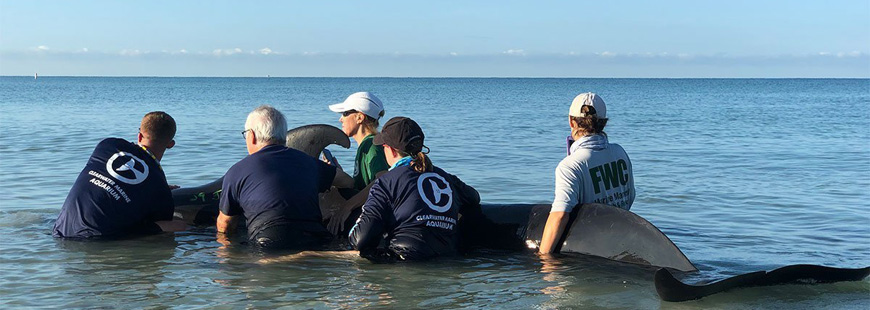Top photo: pilot whale with a rescue team from the Clearwater Marine Aquarium, FL.
The ocean means a lot to a lot of people. Here’s why it means so much to me and how climate change and its impact on fish and habitat fit in.
For years I had a scallop recreational fishing license on Nantucket. I would go there for long weekends and scallop all I could. When not scalloping I use to love to take a run or bike ride down to the ocean. I would walk across the sandy beach and carefully approach the incoming waves that gently washed up the sandy beach. I would stand at the water’s edge just before the wave started to roll back, reach down and touch the water bringing up just enough of it to my mouth to taste. It is a tradition I have repeated hundreds of times in my life.
On one Nantucket winter morning, as I reached down to touch the ocean, I caught the movement of a large black object to my left about 200 yards down the beach and off shore about 100 yards. It was a beached pilot whale floundering in the low water caught on a sandbar. And, there was no other person in sight. I ran down the beach. Feeling a bit helpless I stood at the shore and yelled out to the whale, “I know you are stuck, I am going to get help.” I ran up the path from the beach and found a couple that had a cellphone. They called the police who summoned the mammal rescue team. The whale ultimately died after attempts to rescue it.
I never found out exactly why that whale beached itself and died. However, studies since this stranding, which happened about twenty years ago, have shown climate change has put a strain on prey populations. Climate change impacts on prey populations have forced pilot whales to search for prey in other areas of the ocean, increasing beach-stranding occurrences.
This experience touched me for life. It drove home the fragility of ocean sea life and the ocean environment.
Today, many are betting on short-term gains concerning climate change. We believe in short-term gains from burning fossil fuels rather than having a long-term view of renewable energy, both wind and solar power; short-term gains from taking more fish out of the ocean today to the detriment of the species (this happened in recent years for both red snapper in the Gulf of Mexico and summer flounder off the coast of New Jersey); or the short-term gains from exploring, drilling and capturing gas and oil on the ocean floor where all we have to lose is everything from a toxic spill or the creation of more carbon in our air by burning those fossil fuels.
The signs of climate change impacts on fish, habitat and mankind are too numerous to list. Our oceans have been acting as heat absorbers for much of the heat generated by climate change. In 2018 our oceans absorbed 93 percent of the heat our carbon emissions trapped in the atmosphere. The ocean would never release all this retained heat at once, but if the heat stored in the world’s oceans since 1955 was instantly transferred, NOAA relates the atmosphere would warm by 65 degrees F.
The Gulf of Maine is warming faster than 90 percent of all the global oceans. This past year, even though we had cooler temperatures, we were still above normal in the Gulf of Maine. And, all along the East Coast the water level is rising at an accelerated pace from the melting of polar ice caps, caused by warming from above (the atmosphere) and below (warming water). Coastal homes along our beaches are disappearing, habitat areas close to shore that act as buffer zones between the ocean and land are fading away as the ocean rises.
And, the abundance and composition of fish we catch has changed dramatically and will continue to change. On my charter boat the fish we catch today is vastly different that the composition of fish fifteen years ago. The cold water fish are gone from southern New England (winter flounder, cod and lobster) and the warm water fish (black sea bass, scup and summer founder) are here in greater abundance.
The point of sharing this is to illuminate the need for immediate action. We are not powerless. We can influence political action by supporting and voting for leaders who aim to preserve the environment, stabilizing it to turn back the impacts of climate change. And, we can vote political leaders out of office for offending the environment with their inaction or actions. By virtue of the fact that we are citizens of the same planet, we each have an investment, a stake and a responsibility to steward environmental efforts, no matter how small or large.
We need, I need, to take action for selfish reasons too; I want to keep going to the water’s edge and tasting the salt water for years to come.


